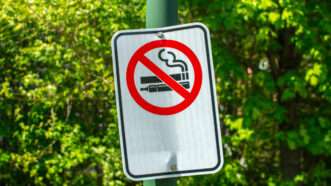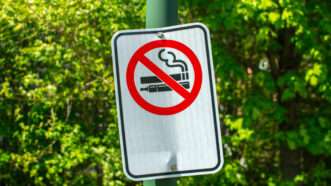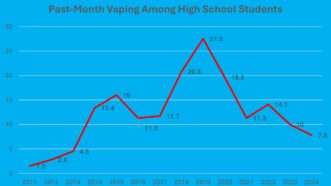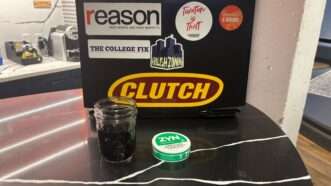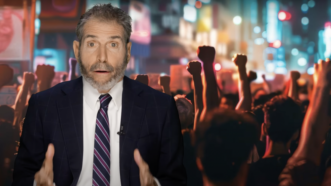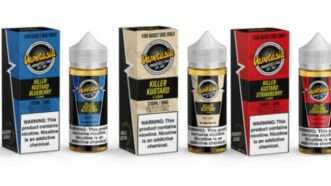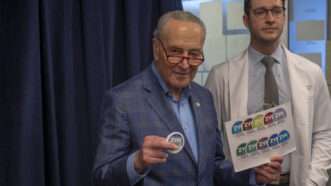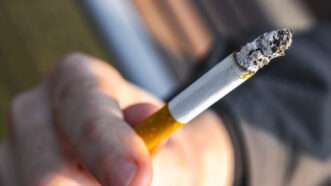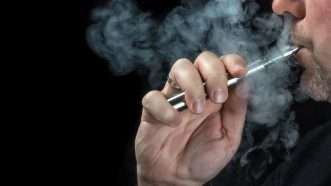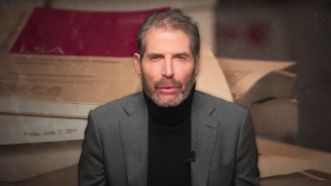Vaping
Oregon's E-Cigarette Censorship Is Unconstitutional—and Makes No Sense
Sometimes the state's rules require stores to cover almost the entire label of products—in places that don't even admit minors.
10 of the Worst State Laws Going Into Effect in July
From minimum wage hikes to bans on cellphones in public schools, here are some of the most ridiculous ways state governments are interfering with Americans’ lives.
Trump Promised To 'Save Vaping.' His FDA Head Does Not Seem Inclined To Do That.
Marty Makary grossly exaggerates the prevalence of adolescent nicotine addiction, the concern underlying his agency's restrictions on e-cigarette flavors.
Gen Zyn: Nicotine Pouches Help Curb Youth Smoking Rates
As young adults swap cigarettes and vapes for oral nicotine products, policymakers should recognize this shift as harm reduction instead of cracking down on personal choice.
All Vapes Are Flavored Vapes, Some Just Have Cigarette Flavors
A plea for more accurate descriptions of non-combustible nicotine products.
The Supreme Court Blesses the FDA's Rejection of Flavored Nicotine Vapes
The justices unanimously overturned a 5th Circuit decision that deemed the agency's treatment of e-liquids "arbitrary and capricious."
Sell Flavored Tobacco in Massachusetts, Go To Jail
Massachusetts outlawed flavored tobacco. Now, just as criminal justice groups warned, a vape shop owner is serving time.
The FDA Proposes a De Facto Cigarette Ban, Which Would Expand the Disastrous War on Drugs
Mandating negligible nicotine levels in tobacco products would create a big black market and criminalize currently legal transactions.
Another Study on Flavored Vaping Products the FDA Can Ignore
Evidence continues to accumulate that non-tobacco-flavored vaping products can help reduce or discourage smoking.
Could the FDA's Approach to Vaping Cause an Increase in Smoking?
A growing body of evidence suggests bans on flavored vaping products will result in more young people smoking, but the FDA does not seem to care.
Shooting the Messenger and Blaming the Victim
How cops, politicians, and bureaucrats tried to dodge responsibility in 2024
A Change in Administrations Underlines the Stakes of an E-Cigarette Case SCOTUS Heard This Week
An e-liquid manufacturer is challenging the FDA's "arbitrary and capricious" rejection of flavored vaping products.
Food and Drug Administration Defends Refusal To Approve Flavored E-Cigarettes Before the Supreme Court
The FDA’s regulations are burdensome and unnecessary to address the inflated high school vaping epidemic.
Activists Profiting Off Panic Are Wrong. The World Is Getting Better.
But if they admitted that, they would be out of a job.
SCOTUS Will Decide Whether the FDA's 'Regulatory Switcheroos' on Vaping Were 'Arbitrary and Capricious'
The 5th Circuit ruled that the agency violated the Administrative Procedure Act when it rejected applications from manufacturers of flavored nicotine e-liquids.
FDA Belatedly and Arbitrarily Approves Menthol Vapes
The agency's inscrutable approach to harm-reducing nicotine products sacrifices consumer choice and public health on the altar of youth protection.
Banning Flavored Tobacco Products Doesn't Work—We Have the Trash To Prove It
Researchers examined garbage placed in public receptacles in Washington, D.C., and New York City and found that the locales’ bans on flavored tobacco products have unquestionably failed.
The Deadly Tobacco Drug War Down Under
Australia’s Prohibition-style attempts to abolish nicotine use have predictably led to a new drug war being fought over a legal substance.
More Evidence that Bans on Flavored Vaping Products May Increase Teen Smoking
Policies that increase the use of traditional cigarettes are unlikely to improve public health.
Will the FDA Adopt an Arbitrary and Capricious Ban on Menthol Cigarettes?
The research the FDA relies upon to claim banning menthol cigarettes would improve public health is not aligned with the agency's approach to tobacco regulation.
Solicitor General Takes Vaping to the Supreme Court
The Department of Justice is asking the Supreme Court to review the Fifth Circuit's Rejection of the FDA's "Surprise Switcheroo."
Expanding the Drug War To Include Tobacco Would Be a Big Mistake
The judicially approved Brookline ban reflects a broader trend among progressives who should know better.
When Doctors Are the Source of Public Health Misinformation
Medical professionals are often unaware of the relevant research on the relative risks of tobacco products, and that can matter for public health.
Review: Netflix Delivers a Surprisingly Balanced Take on Vaping
Big Vape presents differing views on the supposed youth vaping epidemic.
Chuck Schumer Attacks Lifesaving Zyn Nicotine Pouches
Zyn pouches are a dramatically safer alternative to smoking.
It's Not a Cigarette. It's Not a Vape. And It's Big in Japan.
Heated tobacco products are coming to America, at long last. How will they change the landscape for smokers and prohibitionists?
En Banc Fifth Circuit Rejects FDA's Vaping Regulation "Surprise Switcheroo"
Another significant court loss for the Food & Drug Administration's arbitrary approach to regulating vaping products.
'I Relied on Others,' 'Documents Were Filed in the Wrong Place,' and Other Memorable Excuses
The year's highlights in blame shifting.
Repeal Day Lessons for Tobacco Prohibitionists
Today’s nicotine prohibitionists may do well to take a few moments to contemplate their anti-alcohol predecessors.
Remember the Teen Vaping 'Epidemic'?
Policies inspired by that exaggerated threat continue to undermine the harm-reducing potential of e-cigarettes.
Take It From Brazil, Biden's Ban on Flavored Cigarettes and Cigars Will Be a Disaster
Brazil now has one of the largest cigarette markets in the world, despite its efforts to rid the country of cigarettes through prohibition.
Sales Data Indicate That Restrictions on Flavored Vaping Products Encourage Smoking
A study found a "high rate of substitution" between vapes and cigarettes, suggesting that policies aimed at preventing underage use are undermining public health.
How Bans on Flavored Vapes Could Increase Teen Smoking
Well-intentioned restricitons on selling vaping products with non-tobacco flavors could have dire unintended consequences.
American Lung Association Demands the FDA Mislead the Public About Vaping
Providing accurate information about the risks of different nicotine products is long overdue.
Another Appeals Court Accuses the FDA of Committing "Surprise Switcheroo"
The U.S. Court of Appeals for the D.C. Circuit takes issue with how the FDA evaluated Fontem's unflavored vaping products.
Premium Cigars Escape FDA Regulation for Now
The FDA failed to consider whether premium cigars warranted a different regulatory approach than cigarettes.
Uneducating Americans on Vaping
Since the FDA began regulating vaping products as "tobacco" products, American ignorance about vaping's realtive risks has gotten worse.
Why Does Alabama Only Let You Consume Peach-Flavored Edibles?
The state seems to think kids don't like the taste of peach.
Do Studies Show Vaping Causes Cancer? No.
Even the best studies haven't surmounted a key statistical issue, and they tend to distort the evidence to make e-cigarettes look dangerous.
The 5th Circuit Rebukes the FDA for Flouting the Law While Imposing a De Facto Ban on Flavored E-Cigarettes
The appeals court says regulators violated the Administrative Procedure Act when they tried to pull menthol vapes off the market.
Fifth Circuit Again Stays FDA Denial of E-Cigarette Product Application
Another opinion exposing the Food and Drug Administration's vaping problem.
Shoddy Research Reinforces Anti-Vaping Narrative
Thanks to tendentiously sloppy research, most Americans think vaping is just as dangerous as smoking. That’s not true.
Massachusetts' Tobacco Ban Went as Badly as You'd Expect
And now the state thinks it needs to crack down even more.
Meet the Students Pushing Back Against Socialism
"It's very easy for politicians to legislate freedom away," says Northwood University's Kristin Tokarev. "But it's incredibly hard to get back."

